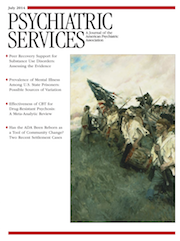The Role of EBPs in Behavioral Health Treatment
The Substance Abuse and Mental Health Services Administration (SAMHSA) believes that prevention works, treatment is effective, and people living with mental and substance use disorders can and do recover. Implementation of services with demonstrated effectiveness is vital to creating service systems that support recovery and are able to meet America’s behavioral health needs. Demonstrating effectiveness, however, is challenging, as has been shown in the Assessing the Evidence Base (AEB) Series, which concludes publication in this issue. Factors such as sample size, the number of studies reviewed, and other design limitations can reduce the strength of the conclusions drawn from studies and reviews.
Evidence is complex and comes in multiple forms. The AEB Series addresses one component of the evidence spectrum—evidence obtained through controlled clinical trials and quasi-experiments. Services assessed through these methods and identified as evidence-based practices (EBPs) are often viewed as the gold standard of clinical care. However, being identified as an EBP, as are the services reviewed in the AEB Series, simply means that the service or program, when designed and delivered as described, is more efficacious than other comparative services for a larger proportion of the population studied. Being identified as an EBP does not mean that a practice is right for everyone, in every setting, and at every time. In fact, the AEB Series has highlighted the need for more research assessing the effectiveness of services for individuals from diverse racial, ethnic, and cultural groups. As insurance coverage increases for behavioral health conditions as a result of the Affordable Care Act and the federal parity law, health care systems will become increasingly diverse. Having a better sense of which services work, for whom, and in what settings will help equip these systems to meet the needs of all people accessing care.
The behavioral health field needs more EBPs and needs more than just EBPs. It also needs innovation and evidence-based thinking at the individual, program, and system levels. Although the AEB Series reviewed traditional research, narrative evidence from individuals who experience disorders, from their families and caregivers, and from the community should also be considered. For many, the best evidence may be from individuals’ and families’ own histories with services, programs, and practitioners, as well as with peers.
SAMHSA works with academic, research, grantee, and funding partners to support EBPs and to foster new approaches—practice-based evidence—to improve outcomes for individuals, families, and communities. SAMHSA also funds demonstrations, conducts evaluations, disseminates proven and promising models, provides technical assistance, convenes expert panels, and offers strategic dialogue and policy opportunities to advance the behavioral health of the nation. America deserves nothing less.



